- Home
- Franz Kafka
Collected Stories Page 21
Collected Stories Read online
Page 21
In spite of the obvious haste with which he was discarding first his uniform jacket and then all his clothing, he handled each garment with loving care, he even ran his fingers caressingly over the silver lace on the jacket and shook a tassel into place. This loving care was certainly out of keeping with the fact that as soon as he had a garment off he flung it at once with a kind of unwilling jerk into the pit. The last thing left to him was his short sword with the sword belt. He drew it out of the scabbard, broke it, then gathered all together, the bits of the sword, the scabbard, and the belt, and flung them so violently down that they clattered into the pit.
Now he stood naked there. The explorer bit his lips and said nothing. He knew very well what was going to happen, but he had no right to obstruct the officer in anything. If the judicial procedure which the officer cherished were really so near its end – possibly as a result of his own intervention, as to which he felt himself pledged – then the officer was doing the right thing; in his place the explorer would not have acted otherwise.
The soldier and the condemned man did not understand at first what was happening, at first they were not even looking on. The condemned man was gleeful at having got the handkerchiefs back, but he was not allowed to enjoy them for long, since the soldier snatched them with a sudden, unexpected grab. Now the condemned man in turn was trying to twitch them from under the belt where the soldier had tucked them, but the soldier was on his guard. So they were wrestling, half in jest. Only when the officer stood quite naked was their attention caught. The condemned man especially seemed struck with the notion that some great change was impending. What had happened to him was now going to happen to the officer. Perhaps even to the very end. Apparently the foreign explorer had given the order for it. So this was revenge. Although he himself had not suffered to the end, he was to be revenged to the end. A broad, silent grin now appeared on his face and stayed there all the rest of the time.
The officer, however, had turned to the machine. It had been clear enough previously that he understood the machine well, but now it was almost staggering to see how he managed it and how it obeyed him. His hand had only to approach the Harrow for it to rise and sink several times till it was adjusted to the right position for receiving him; he touched only the edge of the Bed and already it was vibrating; the felt gag came to meet his mouth, one could see that the officer was really reluctant to take it but he shrank from it only a moment, soon he submitted and received it. Everything was ready, only the straps hung down at the sides, yet they were obviously unnecessary, the officer did not need to be fastened down. Then the condemned man noticed the loose straps, in his opinion the execution was incomplete unless the straps were buckled, he gestured eagerly to the soldier and they ran together to strap the officer down. The latter had already stretched out one foot to push the lever that started the Designer; he saw the two men coming up; so he drew his foot back and let himself be buckled in. But now he could not reach the lever; neither the soldier nor the condemned man would be able to find it, and the explorer was determined not to lift a finger. It was not necessary; as soon as the straps were fastened the machine began to work; the Bed vibrated, the needles flickered above the skin, the Harrow rose and fell. The explorer had been staring at it quite a while before he remembered that a wheel in the Designer should have been creaking; but everything was quiet, not even the slightest hum could be heard.
Because it was working so silently the machine simply escaped one’s attention. The explorer observed the soldier and the condemned man. The latter was the more animated of the two, everything in the machine interested him, now he was bending down and now stretching up on tiptoe, his forefinger was extended all the time pointing out details to the soldier. This annoyed the explorer. He was resolved to stay till the end, but he could not bear the sight of these two. ‘Go back home,’ he said. The soldier would have been willing enough, but the condemned man took the order as a punishment. With clasped hands he implored to be allowed to stay, and when the explorer shook his head and would not relent, he even went down on his knees. The explorer saw that it was no use merely giving orders, he was on the point of going over and driving them away. At that moment he heard a noise above him in the Designer. He looked up. Was that cogwheel going to make trouble after all? But it was something quite different. Slowly the lid of the Designer rose up and then clicked wide open. The teeth of a cogwheel showed themselves and rose higher, soon the whole wheel was visible, it was as if some enormous force were squeezing the Designer so that there was no longer room for the wheel, the wheel moved up till it came to the very edge of the Designer, fell down, rolled along the sand a little on its rim, and then lay flat. But a second wheel was already rising after it, followed by many others, large and small and indistinguishably minute, the same thing happened to all of them, at every moment one imagined the Designer must now really be empty, but another complex of numerous wheels was already rising into sight, falling down, trundling along the sand, and lying flat. This phenomenon made the condemned man completely forget the explorer’s command, the cogwheels fascinated him, he was always trying to catch one and at the same time urging the soldier to help, but always drew back his hand in alarm, for another wheel always came hopping along which, at least on its first advance, scared him off.
The explorer, on the other hand, felt greatly troubled; the machine was obviously going to pieces; its silent working was a delusion; he had a feeling that he must now stand by the officer, since the officer was no longer able to look after himself. But while the tumbling cogwheels absorbed his whole attention he had forgotten to keep an eye on the rest of the machine; now that the last cogwheel had left the Designer, however, he bent over the Harrow and had a new and still more unpleasant surprise. The Harrow was not writing, it was only jabbing, and the Bed was not turning the body over but only bringing it up quivering against the needles. The explorer wanted to do something, if possible, to bring the whole machine to a standstill, for this was no exquisite torture such as the officer desired, this was plain murder. He stretched out his hands. But at that moment the Harrow rose with the body spitted on it and moved to the side, as it usually did only when the twelfth hour had come. Blood was flowing in a hundred streams, not mingled with water, the water jets too had failed to function. And now the last action failed to fulfill itself, the body did not drop off the long needles, streaming with blood it went on hanging over the pit without falling into it. The Harrow tried to move back to its old position, but as if it had itself noticed that it had not yet got rid of its burden it stuck after all where it was, over the pit. ‘Come and help!’ cried the explorer to the other two, and himself seized the officer’s feet. He wanted to push against the feet while the others seized the head from the opposite side and so the officer might be slowly eased off the needles. But the other two could not make up their minds to come; the condemned man actually turned away; the explorer had to go over to them and force them into position at the officer’s head. And here, almost against his will, he had to look at the face of the corpse. It was as it had been in life; no sign was visible of the promised redemption; what the others had found in the machine the officer had not found; the lips were firmly pressed together, the eyes were open, with the same expression as in life, the look was calm and convinced, through the forehead went the point of the great iron spike.
As the explorer, with the soldier and the condemned man behind him, reached the first houses of the colony, the soldier pointed to one of them and said: ‘There is the teahouse.’
In the ground floor of the house was a deep, low, cavernous space, its walls and ceiling blackened with smoke. It was open to the road all along its length. Although this teahouse was very little different from the other houses of the colony, which were all very dilapidated, even up to the Commandant’s palatial headquarters, it made on the explorer the impression of a historic tradition of some kind, and he felt the power of past days. He went near to it, followed by his companions, right up b
etween the empty tables that stood in the street before it, and breathed the cool, heavy air that came from the interior. ‘The old man’s buried here,’ said the soldier, ‘the priest wouldn’t let him lie in the churchyard. Nobody knew where to bury him for a while, but in the end they buried him here. The officer never told you about that, for sure, because of course that’s what he was most ashamed of. He even tried several times to dig the old man up by night, but he was always chased away.’ ‘Where is the grave?’ asked the explorer, who found it impossible to believe the soldier. At once both of them, the soldier and the condemned man, ran before him pointing with outstretched hands in the direction where the grave should be. They led the explorer right up to the back wall, where guests were sitting at a few tables. They were apparently dock laborers, strong men with short, glistening, full black beards. None had a jacket, their shirts were torn, they were poor, humble creatures. As the explorer drew near, some of them got up, pressed close to the wall, and stared at him. ‘It’s a foreigner,’ ran the whisper around him, ‘he wants to see the grave.’ They pushed one of the tables aside, and under it there was really a gravestone. It was a simple stone, low enough to be covered by a table. There was an inscription on it in very small letters, the explorer had to kneel down to read it. This was what it said: ‘Here rests the old Commandant. His adherents, who now must be nameless, have dug this grave and set up this stone. There is a prophecy that after a certain number of years the Commandant will rise again and lead his adherents from this house to recover the colony. Have faith and wait!’ When the explorer had read this and risen to his feet he saw all the bystanders around him smiling, as if they too had read the inscription, had found it ridiculous, and were expecting him to agree with them. The explorer ignored this, distributed a few coins among them, waiting till the table was pushed over the grave again, quitted the teahouse, and made for the harbor.
The soldier and the condemned man had found some acquaintances in the teahouse, who detained them. But they must have soon shaken them off, for the explorer was only halfway down the long flight of steps leading to the boats when they came rushing after him. Probably they wanted to force him at the last minute to take them with him. While he was bargaining below with a ferryman to row him to the steamer, the two of them came headlong down the steps, in silence, for they did not dare to shout. But by the time they reached the foot of the steps the explorer was already in the boat, and the ferryman was just casting off from the shore. They could have jumped into the boat, but the explorer lifted a heavy knotted rope from the floor boards, threatened them with it, and so kept them from attempting the leap.
Translated by Willa and Edwin Muir
A Country Doctor (1919)
The New Advocate
WE HAVE a new advocate, Dr. Bucephalus. There is little in his appearance to remind you that he was once Alexander of Macedon’s battle charger. Of course, if you know his story, you are aware of something. But even a simple usher whom I saw the other day on the front steps of the Law Courts, a man with the professional appraisal of the regular small bettor at a racecourse, was running an admiring eye over the advocate as he mounted the marble steps with a high action that made them ring beneath his feet.
In general the Bar approves the admission of Bucephalus. With astonishing insight people tell themselves that, modern society being what it is, Bucephalus is in a difficult position, and therefore, considering also his importance in the history of the world, he deserves at least a friendly reception. Nowadays – it cannot be denied – there is no Alexander the Great. There are plenty of men who know how to murder people; the skill needed to reach over a banqueting table and pink a friend with a lance is not lacking; and for many Macedonia is too confining, so that they curse Philip, the father – but no one, no one at all, can blaze a trail to India. Even in his day the gates of India were beyond reach, yet the King’s sword pointed the way to them. Today the gates have receded to remoter and loftier places; no one points the way; many carry swords, but only to brandish them, and the eye that tries to follow them is confused.
So perhaps it is really best to do as Bucephalus has done and absorb oneself in law books. In the quiet lamplight, his flanks unhampered by the thighs of a rider, free and far from the clamor of battle, he reads and turns the pages of our ancient tomes.
Translated by Willa and Edwin Muir
A Country Doctor
I WAS in great perplexity; I had to start on an urgent journey; a seriously ill patient was waiting for me in a village ten miles off; a thick blizzard of snow filled all the wide spaces between him and me; I had a gig, a light gig with big wheels, exactly right for our country roads; muffled in furs, my bag of instruments in my hand, I was in the courtyard all ready for the journey; but there was no horse to be had, no horse. My own horse had died in the night, worn out by the fatigues of this icy winter; my servant girl was now running around the village trying to borrow a horse; but it was hopeless, I knew it, and I stood there forlornly, with the snow gathering more and more thickly upon me, more and more unable to move. In the gateway the girl appeared, alone, and waved the lantern; of course, who would lend a horse at this time for such a journey? I strode through the courtyard once more; I could see no way out; in my confused distress I kicked at the dilapidated door of the yearlong uninhabited pigsty. It flew open and flapped to and fro on its hinges. A steam and smell as of horses came out from it. A dim stable lantern was swinging inside from a rope. A man, crouching on his hams in that low space, showed an open blue-eyed face. ‘Shall I yoke up?’ he asked, crawling out on all fours. I did not know what to say and merely stooped down to see what else was in the sty. The servant girl was standing beside me. ‘You never know what you’re going to find in your own house,’ she said, and we both laughed. ‘Hey there, Brother, hey there, Sister!’ called the groom, and two horses, enormous creatures with powerful flanks, one after the other, their legs tucked close to their bodies, each well-shaped head lowered like a camel’s, by sheer strength of buttocking squeezed out through the door hole which they filled entirely. But at once they were standing up, their legs long and their bodies steaming thickly. ‘Give him a hand,’ I said, and the willing girl hurried to help the groom with the harnessing. Yet hardly was she beside him when the groom clipped hold of her and pushed his face against hers. She screamed and fled back to me; on her cheek stood out in red the marks of two rows of teeth. ‘You brute,’ I yelled in fury, ‘do you want a whipping?’ but in the same moment reflected that the man was a stranger; that I did not know where he came from, and that of his own free will he was helping me out when everyone else had failed me. As if he knew my thoughts he took no offense at my threat but, still busied with the horses, only turned around once toward me. ‘Get in,’ he said then, and indeed: everything was ready. A magnificent pair of horses, I observed, such as I had never sat behind, and I climbed in happily. ‘But I’ll drive, you don’t know the way,’ I said. ‘Of course,’ said he, ‘I’m not coming with you anyway, I’m staying with Rose.’ ‘No,’ shrieked Rose, fleeing into the house with a justified presentiment that her fate was inescapable; I heard the door chain rattle as she put it up; I heard the key turn in the lock; I could see, moreover, how she put out the lights in the entrance hall and in further flight all though the rooms to keep herself from being discovered. ‘You’re coming with me,’ I said to the groom, ‘or I won’t go, urgent as my journey is. I’m not thinking of paying for it by handing the girl over to you.’ ‘Gee up!’ he said; clapped his hands; the gig whirled off like a log in a freshet; I could just hear the door of my house splitting and bursting as the groom charged at it and then I was deafened and blinded by a storming rush that steadily buffeted all my senses. But this only for a moment, since, as if my patient’s farmyard had opened out just before my courtyard gate, I was already there; the horses had come quietly to a standstill; the blizzard had stopped; moonlight all around; my patient’s parents hurried out of the house, his sister behind them; I was almost lift
ed out of the gig; from their confused ejaculations I gathered not a word; in the sickroom the air was almost unbreathable; the neglected stove was smoking; I wanted to push open a window; but first I had to look at my patient. Gaunt, without any fever, not cold, not warm, with vacant eyes, without a shirt, the youngster heaved himself up from under the feather bedding, threw his arms around my neck, and whispered in my ear: ‘Doctor, let me die.’ I glanced around the room; no one had heard it; the parents were leaning forward in silence waiting for my verdict; the sister had set a chair for my handbag; I opened the bag and hunted among my instruments; the boy kept clutching at me from his bed to remind me of his entreaty; I picked up a pair of tweezers, examined them in the candlelight, and laid them down again. ‘Yes,’ I thought blasphemously, ‘in cases like this the gods are helpful, send the missing horse, add to it a second because of the urgency, and to crown everything bestow even a groom—’ And only now did I remember Rose again; what was I to do, how could I rescue her, how could I pull her away from under that groom at ten miles’ distance, with a team of horses I couldn’t control. These horses, now, they had somehow slipped the reins loose, pushed the windows open from outside, I did not know how; each of them had stuck a head in at a window and, quite unmoved by the startled cries of the family, stood eyeing the patient. ‘Better go back at once,’ I thought, as if the horses were summoning me to the return journey, yet I permitted the patient’s sister, who fancied that I was dazed by the heat, to take my fur coat from me. A glass of rum was poured out for me, the old man clapped me on the shoulder, a familiarity justified by this offer of his treasure. I shook my head; in the narrow confines of the old man’s thoughts I felt ill; that was my only reason for refusing the drink. The mother stood by the bedside and cajoled me toward it; I yielded, and, while one of the horses whinnied loudly to the ceiling, laid my head to the boy’s breast, which shivered under my wet beard. I confirmed what I already knew; the boy was quite sound, something a little wrong with his circulation, saturated with coffee by his solicitous mother, but sound and best turned out of bed with one shove. I am no world reformer and so I let him lie. I was the district doctor and did my duty to the uttermost, to the point where it became almost too much. I was badly paid and yet generous and helpful to the poor. I had still to see that Rose was all right, and then the boy might have his way and I wanted to die too. What was I doing there in that endless winter! My horse was dead, and not a single person in the village would lend me another. I had to get my team out of the pigsty; if they hadn’t chanced to be horses I should have had to travel with swine. That was how it was. And I nodded to the family. They knew nothing about it, and, had they known, would not have believed it. To write prescriptions is easy, but to come to an understanding with people is hard. Well, this should be the end of my visit, I had once more been called out needlessly, I was used to that, the whole district made my life a torment with my night bell, but that I should have to sacrifice Rose this time as well, the pretty girl who had lived in my house for years almost without my noticing her – that sacrifice was too much to ask, and I had somehow to get it reasoned out in my head with the help of what craft I could muster, in order not to let fly at this family, which with the best will in the world could not restore Rose to me. But as I shut my bag and put an arm out for my fur coat, the family meanwhile standing together, the father sniffing at the glass of rum in his hand, the mother, apparently disappointed in me – why, what do people expect? – biting her lips with tears in her eyes, the sister fluttering a blood-soaked towel, I was somehow ready to admit conditionally that the boy might be ill after all. I went toward him, he welcomed me smiling as if I were bringing him the most nourishing invalid broth – ah, now both horses were whinnying together; the noise, I suppose, was ordained by heaven to assist my examination of the patient – and this time I discovered that the boy was indeed ill. In his right side, near the hip, was an open wound as big as the palm of my hand. Rose-red, in many variations of shade, dark in the hollows, lighter at the edges, softly granulated, with irregular clots of blood, open as a surface mine to the daylight. That was how it looked from a distance. But on a closer inspection there was another complication. I could not help a low whistle of surprise. Worms, as thick and as long as my little finger, themselves rose-red and blood-spotted as well, were wriggling from their fastness in the interior of the wound toward the light, with small white heads and many little legs. Poor boy, you were past helping. I had discovered your great wound; this blossom in your side was destroying you. The family was pleased; they saw me busying myself; the sister told the mother, the mother the father, the father told several guests who were coming in, through the moonlight at the open door, walking on tiptoe, keeping their balance with outstretched arms. ‘Will you save me?’ whispered the boy with a sob, quite blinded by the life within his wound. That is what people are like in my district. Always expecting the impossible from the doctor. They have lost their ancient beliefs; the parson sits at home and unravels his vestments, one after another; but the doctor is supposed to be omnipotent with his merciful surgeon’s hand. Well, as it pleases them; I have not thrust my services on them; if they misuse me for sacred ends, I let that happen to me too; what better do I want, old country doctor that I am, bereft of my servant girl! And so they came, the family and the village elders, and stripped my clothes off me; a school choir with the teacher at the head of it stood before the house and sang these words to an utterly simple tune:

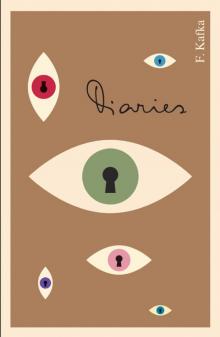 Diaries of Franz Kafka
Diaries of Franz Kafka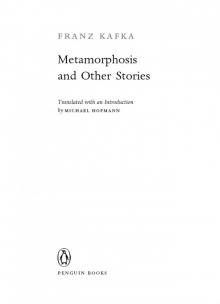 Metamorphosis and Other Stories
Metamorphosis and Other Stories The Castle: A New Translation Based on the Restored Text
The Castle: A New Translation Based on the Restored Text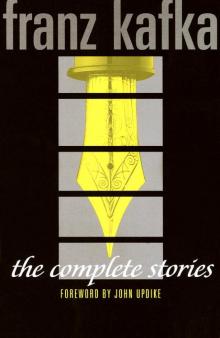 The Complete Stories
The Complete Stories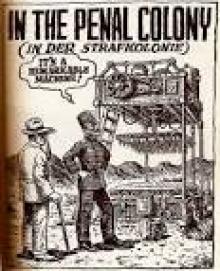 In the Penal Colony
In the Penal Colony The Trial
The Trial Amerika
Amerika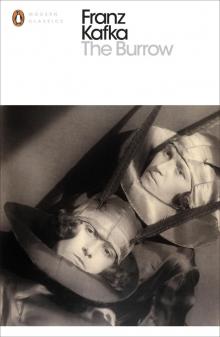 The Burrow: Posthumously Published Short Fiction
The Burrow: Posthumously Published Short Fiction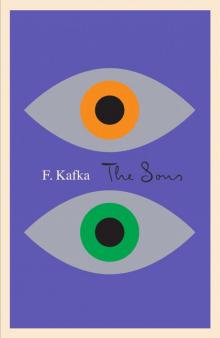 Sons
Sons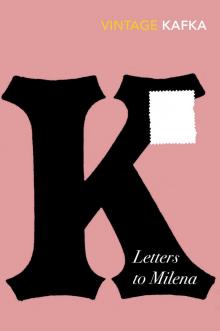 Letters to Milena
Letters to Milena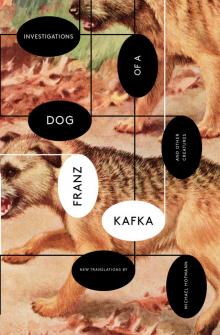 Investigations of a Dog: And Other Creatures
Investigations of a Dog: And Other Creatures Collected Stories
Collected Stories The Great Wall of China
The Great Wall of China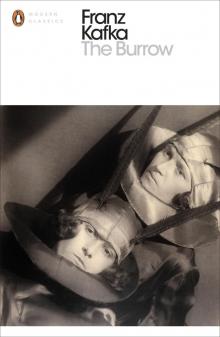 The Burrow
The Burrow The Castle
The Castle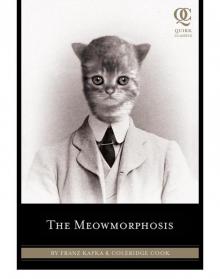 The Meowmorphosis
The Meowmorphosis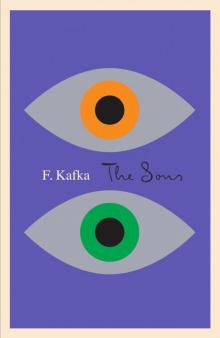 The Sons
The Sons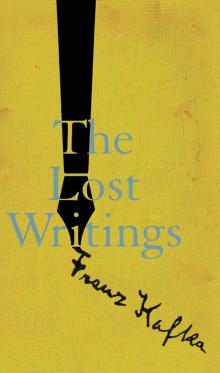 The Lost Writings
The Lost Writings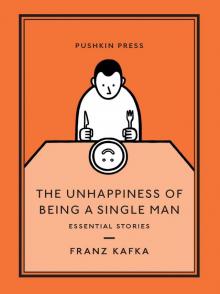 The Unhappiness of Being a Single Man
The Unhappiness of Being a Single Man Amerika: The Missing Person: A New Translation, Based on the Restored Text
Amerika: The Missing Person: A New Translation, Based on the Restored Text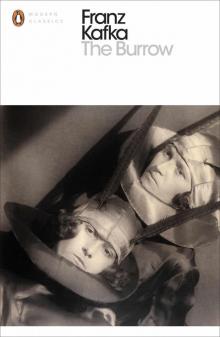 The Burrow: Posthumously Published Short Fiction (Penguin Modern Classics)
The Burrow: Posthumously Published Short Fiction (Penguin Modern Classics)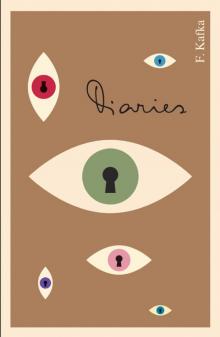 The Diaries of Franz Kafka
The Diaries of Franz Kafka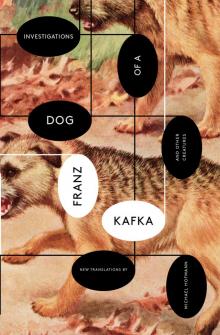 Investigations of a Dog
Investigations of a Dog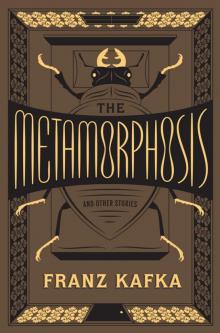 The Metamorphosis and Other Stories
The Metamorphosis and Other Stories The Trial: A New Translation Based on the Restored Text
The Trial: A New Translation Based on the Restored Text